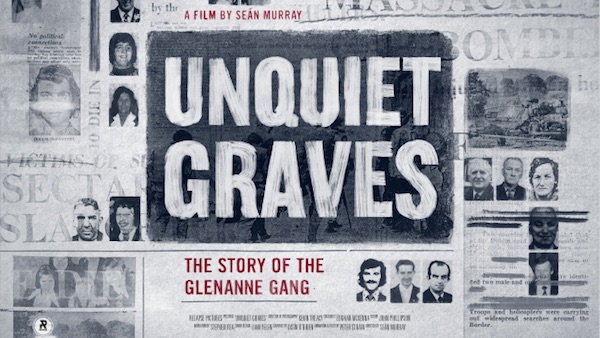
A historic turning point in the long battle against state censorship in the 26 Counties was reached this week when ‘Unquiet Graves’, the story of the loyalist Glenanne Gang and their links to the British Crown Forces, was finally aired by state broadcaster RTE.
Events documented by the film were covered up for decades by a state of official censorship in both Britain and Ireland in which media discussion about state killings in the north of Ireland was suppressed.
Years after his documentary was premiered in Galway in 2018, film maker Sean Murray described the broadcast on Wednesday as a major step for the victims’ families in their search for truth.
Narrated by Murray and by actor Stephen Rea, the documentary chronicles the gang’s bloody killing spree through the infamous “murder triangle” in Counties Tyrone and Armagh in the 1970s. With the help of high-level British protection, the loyalist/UDR/RUC gang killed some 120 prominent Catholics as part of an effort to defeat Irish nationalism in a key area of occupied northern Ireland.
The film interviews family members of those killed and injured by the regional death squad which became known as ‘The Glenanne Gang’. The gang were responsible for the Dublin/Monaghan bombs in 1974 and other large-scale bombings and shootings, although the true extent of the conspiracy behind these atrocities has yet to come fully to light.
One of the most shocking parts of the documentary was the exposure of a plan to attack a primary school, killing all children and teachers in the building. The plan is believed to have been designed to force the IRA into an open civil war which would have suited Britain’s military agenda at the time.
All of the attacks were sanctioned by senior people in the British Crown forces and there is overwhelming evidence their masters in London encouraged them. John Weir, a former member of the gang and a member of the RUC police’s Special Patrol Group in Armagh, who spoke to the film makers, confirmed the British government was aware of the group’s activities at the very highest level.
“It went to the very, very top,” says Weir of the collaboration. “It crossed the water where the politicians knew what was going on and gave the go-ahead. The attitude would have been, ‘you’re doing a great job but don’t get caught’.”
At the end of the film, the screen turns dark and the names of the victims are listed line-by-line in a litany of state-supported murder.
For many, the film confirms the collusion that was widely suspected.
“For decades Republicans have been saying there was collusion between unionist murder gangs and the British security services but nationalist parties and successive Free State governments put it down to Republican propaganda,” said Lasair Dhearg.
“This documentary clearly shows there was collusion and we would argue collusion continues today. People who were very critical of the RUC now welcome that very same force into communities where numerous people were killed.
“The RUC may have changed their name, but their personnel, weaponry, resources, funding and objectives remain largely the same. The only lasting solution to the death and misery imposed by Britain is truth and justice within a 32 County Socialist Republic.”
In the aftermath of the broadcast, Aontú Leader Peadar Tóibín revealed that he has asked three separate Taoisigh over a period of five years to meet with victims and survivors of the Glenanne Gang, but that none had done so. He said the families “simply seek some assistance in their quest for the truth”.
Despite the broadcast, the lack of a media response points to continuing censorship. The film-maker has said he wasn’t surprised.
“As expected I was of the opinion that there are many people who will be embarrassed by the images within the film,” he said in an interview following the broadcast.
“Fundamentally, the documentary confronts the dominant narrative around the conflict, a narrative that is still being promoted and upheld by the Irish and British press.
“What can’t be controlled is the public reaction to Unquiet Graves, people are now questioning the political discourse that has shaped this collective apathy to what went on in the north.”
![[Irish Republican News]](https://republican-news.org/graphics/title_gifs/rn.gif)
![[Irish Republican News]](https://republican-news.org/graphics/title_gifs/harp.gif)

